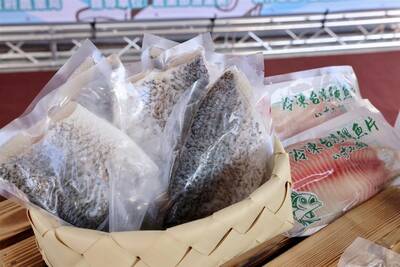The Global Coalition for Taiwanese Languages yesterday held a press conference to protest recent remarks by Chinese Nationalist Party (KMT) Legislator Hung Hsiu-chu (洪秀柱) that using a Romanized phonetic system to teach native languages would constitute a betrayal of Chinese culture.
Hung made the remark at a press conference last Thursday in response to rumors that incoming Minister of Education Tu Cheng-sheng (杜正勝) was pushing for the use of a Romanized phonetic system to teach Hoklo (commonly known as Taiwanese) in elementary schools. Currently, elementary school students are required to take at least one course on a local language, such as Hoklo, Hakka or an Aboriginal tongue.
The coalition, previously named the Global Taiwanese Movement Federation, supports the use of a Romanized phonetic system. It countered Hung's claims, saying the current system is no more loyal to Hoklo than a Romanized system.
"Han characters and the current phonetic system cannot capture the true sound and essence of Hoklo; Hoklo cannot be represented accurately with the Mandarin Chinese system," said Lee Chin-an (李勤岸), a spokesman for the group.
Currently, the Hoklo language in Taiwan is represented by Han characters, with adapted charac-ters representing words unique to Hoklo. The coalition said that such a system was inefficient due to the sheer number of words that would have to be created to represent all the words in Hoklo. The added burden of learning these characters makes Hoklo difficult to learn for non-native speakers, the coalition added.
"A Romanized phonetic system is very easy to learn and facilitates widespread native-language education. If you learn the 18 sounds of the system, then you can speak Hoklo, Hakka, or indigenous languages without any barriers," Lee said.
"Using a Romanized system would make Hoklo a more international language that can be easily learned by all people," Lee added.

Taiwan's Vice President Hsiao Bi-khim (蕭美琴) said Saturday that she would not be intimidated by the Chinese Communist Party (CCP), following reports that Chinese agents planned to ram her car during a visit to the Czech Republic last year. "I had a great visit to Prague & thank the Czech authorities for their hospitality & ensuring my safety," Hsiao said on social media platform X. "The CCP's unlawful activities will NOT intimidate me from voicing Taiwan's interests in the international community," she wrote. Hsiao visited the Czech Republic on March 18 last year as vice president-elect and met with Czech Senate leadership, including

There have been clear signs of Chinese Communist Party (CCP) attempts to interfere in the nationwide recall vote on July 26 in support of Chinese Nationalist Party (KMT) legislators facing recall, an unnamed government official said, warning about possible further actions. The CCP is actively involved in Taiwanese politics, and interference in the recall vote is to be expected, with multiple Chinese state media and TAO attempts to discredit the Democratic Progressive Party (DPP) and undermine public support of their recall movement, the official said. This interference includes a smear campaign initiated this month by a pro-Beijing Hong Kong news outlet against

A week-long exhibition on modern Tibetan history and the Dalai Lama’s global advocacy opened yesterday in Taipei, featuring quotes and artworks highlighting human rights and China’s ongoing repression of Tibetans, Hong Kongers and Uighurs. The exhibition, the first organized by the Human Rights Network for Tibet and Taiwan (HRNTT), is titled “From the Snowy Ridges to the Ocean of Wisdom.” “It would be impossible for Tibetans inside Tibet to hold an exhibition like this — we can do it. because we live in a free and democratic country,” HRNTT secretary-general Tashi Tsering said. Tashi Tsering, a Taiwan-based Tibetan who has never

A first shipment of five tons of Taiwan tilapia was sent from Tainan to Singapore on Wednesday, following an order valued at NT$600,000 (US$20,500) placed with a company in the city. The products, including frozen whole fish and pre- cooked fish belly, were dispatched from Jiangjun Fishing Harbor, where a new aquatic processing and logistics center is under construction. At the launch, Tainan Mayor Huang Wei-che (黃偉哲) called the move a “breakthrough,” marking Taiwan’s expansion into the Singaporean tilapia market. Taiwan’s tilapia exports have traditionally focused on the United States, Canada, and the Middle East, Huang said, adding that the new foothold in